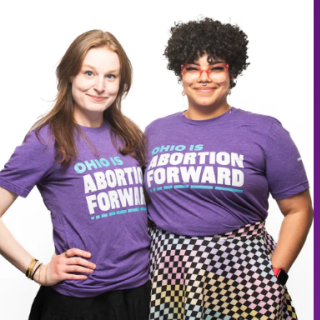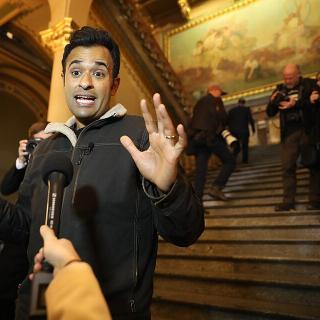Columbus has been truly a “Tale of Two Cities” to emphasize the true meaning of this year’s State of the City Address. While Columbus has been touted in success stories and innovations, there is still that one-third of the community that feels like they are shut out of the entire loop. Columbus Mayor Andrew J. Ginther’s State of the City Address was no different, as two protesters made their voices loud and clear early on in the speech.
The theme of Ginther’s Address, held at historic Columbus West High School in Westgate, was centered about equity. Ginther addressed the auditorium at the beginning of the evening by saying, “Tonight, I share to you my ‘Equity Agenda,’ an agenda that calls out racism and discrimination where it exists, and my plans to address it as your Mayor.”
Ginther said, “Equity is the cornerstone of my administration, tonight, I will lay out what we will be doing this year, and over the next four years, to continue to grow this city and also to assure that we stop racism and discrimination, wherever we see it.”
When Ginther said, “The State of Our City is,” protesters disrupted the speech by shouting out the names of people who were gunned down by Columbus Police Officers and demanding Mayor Ginther and City Leaders take action. Names including Henry Green, Tyre King, and Donna Dalton (also Castleberry) were shouted out by the protesters.
A similar protest halted the Martin Luther King Prayer Breakfast at the Greater Columbus Convention Center last month as Mayor Ginther took to the podium. Two protesters were arrested.
Ginther said, “I see you and I hear you, and I look forward to meeting with you, to hear your voices, you and your group,” to quell the protests from further disrupting his address in the packed school auditorium.
After the two protesters were escorted out of the Auditorium with a loud applause from the audience, Ginther continued his speech by saying, “Dissent is of the highest form of patriotism, and I do not reject or look down on those who are so passionate that they choose to be activists and raise their voices, concerned of injustice. I look forward to meeting with these individuals and the groups they are associated with in the weeks ahead. We need to have ALL voices at the table – those we agree with, and those that we don’t.”
In his speech, Ginther talked about equality, from combatting the housing crisis and the opioid crisis, to combatting the racial barriers in our community, such as improving the city’s toxic police and community relations.
“It’s time for us to discuss the long-term effects going forward, and to explore racism as a public health crisis,” Ginther said about the racial inequality in Columbus. Issues such as eviction rates, socio-economic status, and criminal records are barriers to success for minorities in the ever-so growing Columbus region, as they have been for decades with issues such as redlining, that was prevalent up through the 20th century.
“Black people and communities of color are angry, frustrated, tired, and even fearful of about many things happening across the country, and in the City of Columbus, and as Mayor, it is my job to lead us to solutions.” Ginther said at the beginning of his speech. “Racism is real. Discrimination is real, and they impact the lives of many of our neighbors every day, sometime even multiple times a day.”



